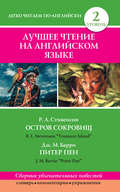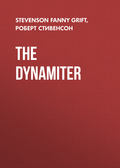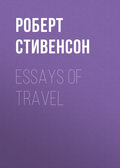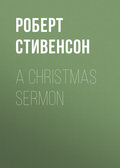
Роберт Льюис Стивенсон
Virginibus Puerisque, and Other Papers
PAN’S PIPES
The world in which we live has been variously said and sung by the most ingenious poets and philosophers: these reducing it to formulæ and chemical ingredients, those striking the lyre in high-sounding measures for the handiwork of God. What experience supplies is of a mingled tissue, and the choosing mind has much to reject before it can get together the materials of a theory. Dew and thunder, destroying Atilla and the Spring lambkins, belong to an order of contrasts which no repetition can assimilate. There is an uncouth, outlandish strain throughout the web of the world, as from a vexatious planet in the house of life. Things are not congruous and wear strange disguises: the consummate flower is fostered out of dung, and after nourishing itself awhile with heaven’s delicate distillations, decays again into indistinguishable soil; and with Cæsar’s ashes, Hamlet tells us, the urchins make dirt pies and filthily besmear their countenance. Nay, the kindly shine of summer, when tracked home with the scientific spyglass, is found to issue from the most portentous nightmare of the universe – the great, conflagrant sun: a world of hell’s squibs, tumultuary, roaring aloud, inimical to life. The sun itself is enough to disgust a human being of the scene which he inhabits; and you would not fancy there was a green or habitable spot in a universe thus awfully lighted up. And yet it is by the blaze of such a conflagration, to which the fire of Rome was but a spark, that we do all our fiddling, and hold domestic tea-parties at the arbour door.
The Greeks figured Pan, the god of Nature, now terribly stamping his foot, so that armies were dispersed; now by the woodside on a summer noon trolling on his pipe until he charmed the hearts of upland ploughmen. And the Greeks, in so figuring, uttered the last word of human experience. To certain smoke-dried spirits matter and motion and elastic aethers, and the hypothesis of this or that other spectacled professor, tell a speaking story; but for youth and all ductile and congenial minds, Pan is not dead, but of all the classic hierarchy alone survives in triumph; goat-footed, with a gleeful and an angry look, the type of the shaggy world: and in every wood, if you go with a spirit properly prepared, you shall hear the note of his pipe.
For it is a shaggy world, and yet studded with gardens; where the salt and tumbling sea receives clear rivers running from among reeds and lilies; fruitful and austere; a rustic world; sunshiny, lewd, and cruel. What is it the birds sing among the trees in pairing-time? What means the sound of the rain falling far and wide upon the leafy forest? To what tune does the fisherman whistle, as he hauls in his net at morning, and the bright fish are heaped inside the boat? These are all airs upon Pan’s pipe; he it was who gave them breath in the exultation of his heart, and gleefully modulated their outflow with his lips and fingers. The coarse mirth of herdsmen, shaking the dells with laughter and striking out high echoes from the rock; the tune of moving feet in the lamplit city, or on the smooth ballroom floor; the hooves of many horses, beating the wide pastures in alarm; the song of hurrying rivers; the colour of clear skies; and smiles and the live touch of hands; and the voice of things, and their significant look, and the renovating influence they breathe forth – these are his joyful measures, to which the whole earth treads in choral harmony. To this music the young lambs bound as to a tabor, and the London shop-girl skips rudely in the dance. For it puts a spirit of gladness in all hearts; and to look on the happy side of nature is common, in their hours, to all created things. Some are vocal under a good influence, are pleasing whenever they are pleased, and hand on their happiness to others, as a child who, looking upon lovely things, looks lovely. Some leap to the strains with unapt foot, and make a halting figure in the universal dance. And some, like sour spectators at the play, receive the music into their hearts with an unmoved countenance, and walk like strangers through the general rejoicing. But let him feign never so carefully, there is not a man but has his pulses shaken when Pan trolls out a stave of ecstasy and sets the world a-singing.
Alas if that were all! But oftentimes the air is changed; and in the screech of the night wind, chasing navies, subverting the tall ships and the rooted cedar of the hills; in the random deadly levin or the fury of headlong floods, we recognise the “dread foundation” of life and the anger in Pan’s heart. Earth wages open war against her children, and under her softest touch hides treacherous claws. The cool waters invite us in to drown; the domestic hearth burns up in the hour of sleep, and makes an end of all. Everything is good or bad, helpful or deadly, not in itself, but by its circumstances. For a few bright days in England the hurricane must break forth and the North Sea pay a toll of populous ships. And when the universal music has led lovers into the paths of dalliance, confident of Nature’s sympathy, suddenly the air shifts into a minor, and death makes a clutch from his ambuscade below the bed of marriage. For death is given in a kiss; the dearest kindnesses are fatal; and into this life, where one thing preys upon another, the child too often makes its entrance from the mother’s corpse. It is no wonder, with so traitorous a scheme of things, if the wise people who created for us the idea of Pan thought that of all fears the fear of him was the most terrible, since it embraces all. And still we preserve the phrase: a panic terror. To reckon dangers too curiously, to hearken too intently for the threat that runs through all the winning music of the world, to hold back the hand from the rose because of the thorn, and from life because of death: this it is to be afraid of Pan. Highly respectable citizens who flee life’s pleasures and responsibilities and keep, with upright hat, upon the midway of custom, avoiding the right hand and the left, the ecstasies and the agonies, how surprised they would be if they could hear their attitude mythologically expressed, and knew themselves as tooth-chattering ones, who flee from Nature because they fear the hand of Nature’s God! Shrilly sound Pan’s pipes; and behold the banker instantly concealed in the bank parlour! For to distrust one’s impulses is to be recreant to Pan.
There are moments when the mind refuses to be satisfied with evolution, and demands a ruddier presentation of the sum of man’s experience. Sometimes the mood is brought about by laughter at the humorous side of life, as when, abstracting ourselves from earth, we imagine people plodding on foot, or seated in ships and speedy trains, with the planet all the while whirling in the opposite direction, so that, for all their hurry, they travel back-foremost through the universe of space. Sometimes it comes by the spirit of delight, and sometimes by the spirit of terror. At least, there will always be hours when we refuse to be put off by the feint of explanation, nicknamed science; and demand instead some palpitating image of our estate, that shall represent the troubled and uncertain element in which we dwell, and satisfy reason by the means of art. Science writes of the world as if with the cold finger of a starfish; it is all true; but what is it when compared to the reality of which it discourses? where hearts beat high in April, and death strikes, and hills totter in the earthquake, and there is a glamour over all the objects of sight, and a thrill in all noises for the ear, and Romance herself has made her dwelling among men? So we come back to the old myth, and hear the goat-footed piper making the music which is itself the charm and terror of things; and when a glen invites our visiting footsteps, fancy that Pan leads us thither with a gracious tremolo; or when our hearts quail at the thunder of the cataract, tell ourselves that he has stamped his hoof in the nigh thicket.
A PLEA FOR GAS LAMPS
Cities given, the problem was to light them. How to conduct individual citizens about the burgess-warren, when once heaven had withdrawn its leading luminary? or – since we live in a scientific age – when once our spinning planet has turned its back upon the sun? The moon, from time to time, was doubtless very helpful; the stars had a cheery look among the chimney-pots; and a cresset here and there, on church or citadel, produced a fine pictorial effect, and, in places where the ground lay unevenly, held out the right hand of conduct to the benighted. But sun, moon, and stars abstracted or concealed, the night-faring inhabitant had to fall back – we speak on the authority of old prints – upon stable lanthorns two stories in height. Many holes, drilled in the conical turret-roof of this vagabond Pharos, let up spouts of dazzlement into the bearer’s eyes; and as he paced forth in the ghostly darkness, carrying his own sun by a ring about his finger, day and night swung to and fro and up and down about his footsteps. Blackness haunted his path; he was beleaguered by goblins as he went; and, curfew being struck, he found no light but that he travelled in throughout the township.
Closely following on this epoch of migratory lanthorns in a world of extinction, came the era of oil-lights, hard to kindle, easy to extinguish, pale and wavering in the hour of their endurance. Rudely puffed the winds of heaven; roguishly clomb up the all-destructive urchin; and, lo! in a moment night re-established her void empire, and the cit groped along the wall, suppered but bedless, occult from guidance, and sorrily wading in the kennels. As if gamesome winds and gamesome youths were not sufficient, it was the habit to sling these feeble luminaries from house to house above the fairway. There, on invisible cordage, let them swing! And suppose some crane-necked general to go speeding by on a tall charger, spurring the destiny of nations, red-hot in expedition, there would indubitably be some effusion of military blood, and oaths, and a certain crash of glass; and while the chieftain rode forward with a purple coxcomb, the street would be left to original darkness, unpiloted, unvoyageable, a province of the desert night.
The conservative, looking before and after, draws from each contemplation the matter for content. Out of the age of gas lamps he glances back slightingly at the mirk and glimmer in which his ancestors wandered; his heart waxes jocund at the contrast; nor do his lips refrain from a stave, in the highest style of poetry, lauding progress and the golden mean. When gas first spread along a city, mapping it forth about evenfall for the eye of observant birds, a new age had begun for sociality and corporate pleasure-seeking, and begun with proper circumstance, becoming its own birthright. The work of Prometheus had advanced by another stride. Mankind and its supper parties were no longer at the mercy of a few miles of sea-fog; sundown no longer emptied the promenade; and the day was lengthened out to every man’s fancy. The city-folk had stars of their own; biddable, domesticated stars.
It is true that these were not so steady, nor yet so clear, as their originals; nor indeed was their lustre so elegant as that of the best wax candles. But then the gas stars, being nearer at hand, were more practically efficacious than Jupiter himself. It is true, again, that they did not unfold their rays with the appropriate spontaneity of the planets, coming out along the firmament one after another, as the need arises. But the lamplighters took to their heels every evening, and ran with a good heart. It was pretty to see man thus emulating the punctuality of heaven’s orbs; and though perfection was not absolutely reached, and now and then an individual may have been knocked on the head by the ladder of the flying functionary, yet people commended his zeal in a proverb, and taught their children to say, “God bless the lamplighter!” And since his passage was a piece of the day’s programme, the children were well pleased to repeat the benediction, not, of course, in so many words, which would have been improper, but in some chaste circumlocution, suitable for infant lips.
God bless him, indeed! For the term of his twilight diligence is near at hand; and for not much longer shall we watch him speeding up the street and, at measured intervals, knocking another luminous hole into the dusk. The Greeks would have made a noble myth of such an one; how he distributed starlight, and, as soon as the need was over, re-collected it; and the little bull’s-eye, which was his instrument, and held enough fire to kindle a whole parish, would have been fitly commemorated in the legend. Now, like all heroic tasks, his labours draw towards apotheosis, and in the light of victory himself shall disappear. For another advance has been effected. Our tame stars are to come out in future, not one by one, but all in a body and at once. A sedate electrician somewhere in a back office touches a spring – and behold! from one end to another of the city, from east to west, from the Alexandra to the Crystal Palace, there is light! Fiat Lux, says the sedate electrician. What a spectacle, on some clear, dark nightfall, from the edge of Hampstead Hill, when in a moment, in the twinkling of an eye, the design of the monstrous city flashes into vision – a glittering hieroglyph many square miles in extent; and when, to borrow and debase an image, all the evening street-lamps burst together into song! Such is the spectacle of the future, preluded the other day by the experiment in Pall Mall. Star-rise by electricity, the most romantic flight of civilisation; the compensatory benefit for an innumerable array of factories and bankers’ clerks. To the artistic spirit exercised about Thirlmere, here is a crumb of consolation; consolatory, at least, to such of them as look out upon the world through seeing eyes, and contentedly accept beauty where it comes.
But the conservative, while lauding progress, is ever timid of innovation; his is the hand upheld to counsel pause; his is the signal advising slow advance. The word electricity now sounds the note of danger. In Paris, at the mouth of the Passage des Princes, in the place before the Opera portico, and in the Rue Drouot at the Figaro office, a new sort of urban star now shines out nightly, horrible, unearthly, obnoxious to the human eye; a lamp for a nightmare! Such a light as this should shine only on murders and public crime, or along the corridors of lunatic asylums, a horror to heighten horror. To look at it only once is to fall in love with gas, which gives a warm domestic radiance fit to eat by. Mankind, you would have thought, might have remained content with what Prometheus stole for them and not gone fishing the profound heaven with kites to catch and domesticate the wildfire of the storm. Yet here we have the levin brand at our doors, and it is proposed that we should henceforward take our walks abroad in the glare of permanent lightning. A man need not be very superstitious if he scruple to follow his pleasures by the light of the Terror that Flieth, nor very epicurean if he prefer to see the face of beauty more becomingly displayed. That ugly blinding glare may not improperly advertise the home of slanderous Figaro, which is a backshop to the infernal regions; but where soft joys prevail, where people are convoked to pleasure and the philosopher looks on smiling and silent, where love and laughter and deifying wine abound, there, at least, let the old mild lustre shine upon the ways of man.







